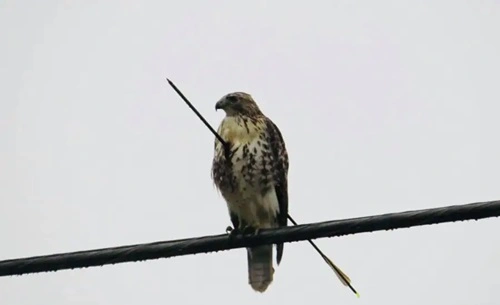Yes, it is illegal to shoot a hawk in the United States. Hawks are protected under the Migratory Bird Treaty Act (MBTA), which makes it unlawful to hunt, capture, kill, or harm them without specific authorization from the federal government. Violations of these protections can result in severe legal penalties, including fines and imprisonment.
Federal Protection Under the Migratory Bird Treaty Act (MBTA)
- What Is the MBTA?
- Enacted in 1918, the MBTA protects over 1,000 species of migratory birds, including hawks.
- The Act prohibits activities such as killing, capturing, or disturbing hawks and their nests or eggs without a permit.
- Hawks Covered Under the MBTA
- All hawk species native to the U.S., including red-tailed hawks, Cooper’s hawks, and sharp-shinned hawks, are protected under the MBTA.
- These protections apply regardless of whether the hawk is on private or public property.
- Permits for Exceptional Circumstances
- The U.S. Fish and Wildlife Service (USFWS) may issue depredation permits to property owners or businesses dealing with significant damage caused by hawks.
- Permits are only granted after non-lethal control methods have been tried and proven ineffective.
Legal Consequences for Shooting a Hawk
- Fines and Penalties
- Violating the MBTA can result in fines of up to $15,000 per offense. Each hawk harmed or killed is considered a separate violation, compounding the penalties.
- Criminal Charges
- Shooting a hawk can result in misdemeanor or felony charges, depending on the circumstances. Criminal penalties include imprisonment of up to six months.
- Civil Penalties
- In addition to federal consequences, violators may face state-level fines or legal action for harming protected wildlife.
Why Hawks Are Protected
- Ecological Importance
- Hawks are apex predators that play a vital role in controlling populations of rodents and other small animals, contributing to a balanced ecosystem.
- Population Conservation
- While hawks are not generally endangered, federal protections help prevent population declines due to habitat loss, hunting, and other human activities.
- Cultural Significance
- Hawks hold cultural and symbolic value in many societies, further emphasizing the need for their protection.
Legal Alternatives for Managing Hawks
- Non-Lethal Deterrents
- Install visual deterrents like reflective tape, owl decoys, or predator balloons to keep hawks away from specific areas.
- Use noise devices to create an unwelcoming environment for hawks.
- Protective Measures for Livestock
- Enclose vulnerable livestock like chickens in covered pens or aviaries to prevent hawk attacks.
- Use guard animals, such as dogs or roosters, to deter hawks naturally.
- Apply for a Depredation Permit
- If hawks pose a significant threat to property, livestock, or public safety, apply for a depredation permit from the USFWS.
- Permits are issued sparingly and require detailed documentation of the problem and previous non-lethal attempts.
Related FAQs
Q1. Can I shoot a hawk if it is attacking my chickens or livestock?
Ans: No, shooting a hawk is illegal under the MBTA, even if it is attacking livestock. Instead, use protective measures like covered enclosures or apply for a depredation permit.
Q2. Are there any circumstances where shooting a hawk is legal?
Ans: Shooting a hawk is only legal if you have obtained a depredation permit from the USFWS. Permits are issued for specific, justified cases after non-lethal methods have failed.
Q3. What happens if I shoot a hawk accidentally?
Ans: Even accidental shooting of a hawk is considered a violation of federal law and can result in fines and penalties. Intent is not required for prosecution under the MBTA.
Q4. How can I keep hawks away from my property?
Ans: Use deterrents like reflective tape, noise devices, and protective enclosures for pets or livestock to prevent hawk interactions legally.
Q5. What should I do if I find an injured hawk?
Ans: Contact a licensed wildlife rehabilitator or local animal control. Handling or attempting to treat a hawk without proper authorization is illegal.
Conclusion
Shooting a hawk is a federal crime under the Migratory Bird Treaty Act, with severe penalties for violations. Instead of resorting to lethal measures, property owners should explore non-lethal alternatives and seek permits if necessary. Protecting hawks not only ensures compliance with the law but also helps maintain ecological balance and biodiversity.


